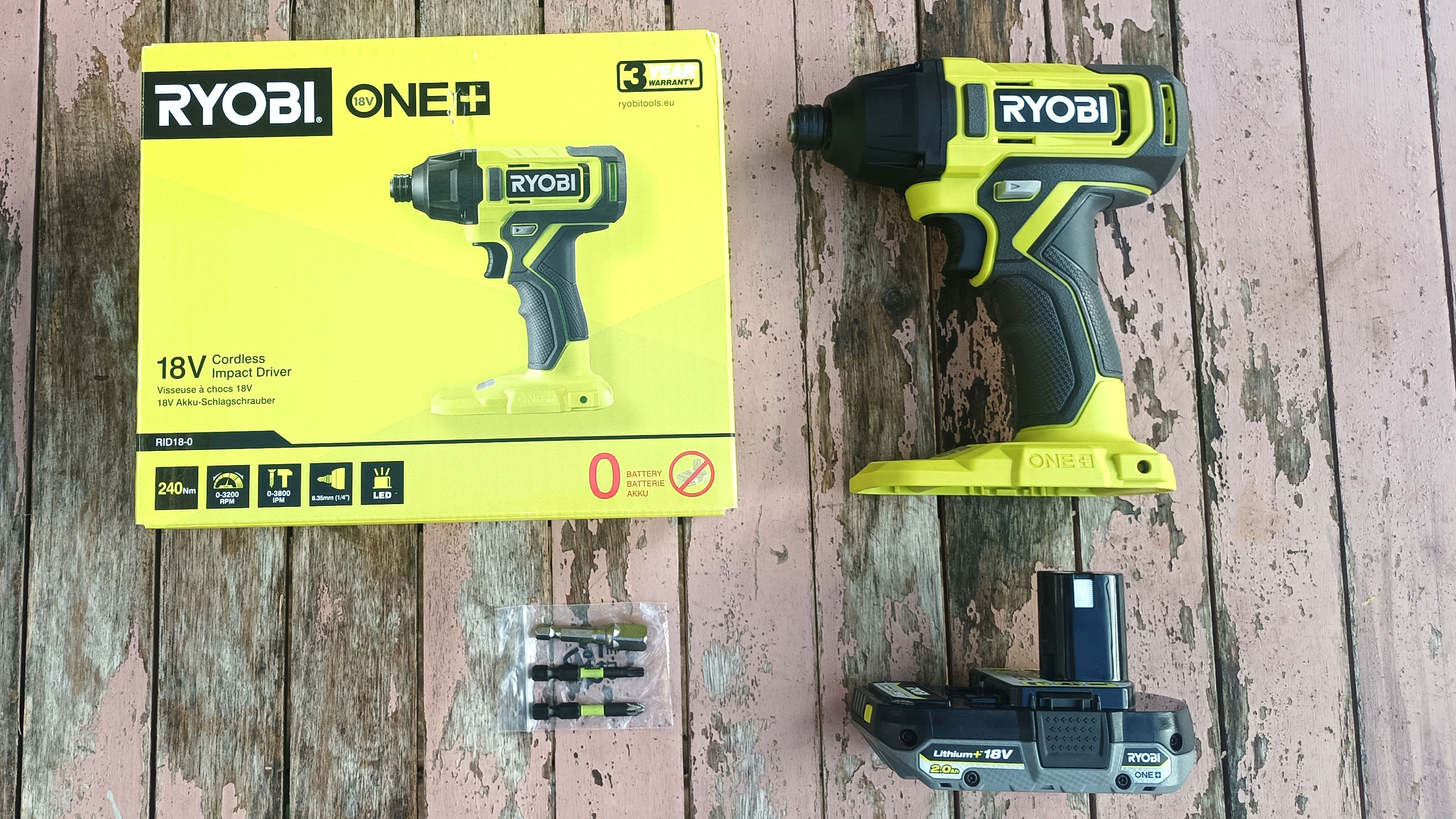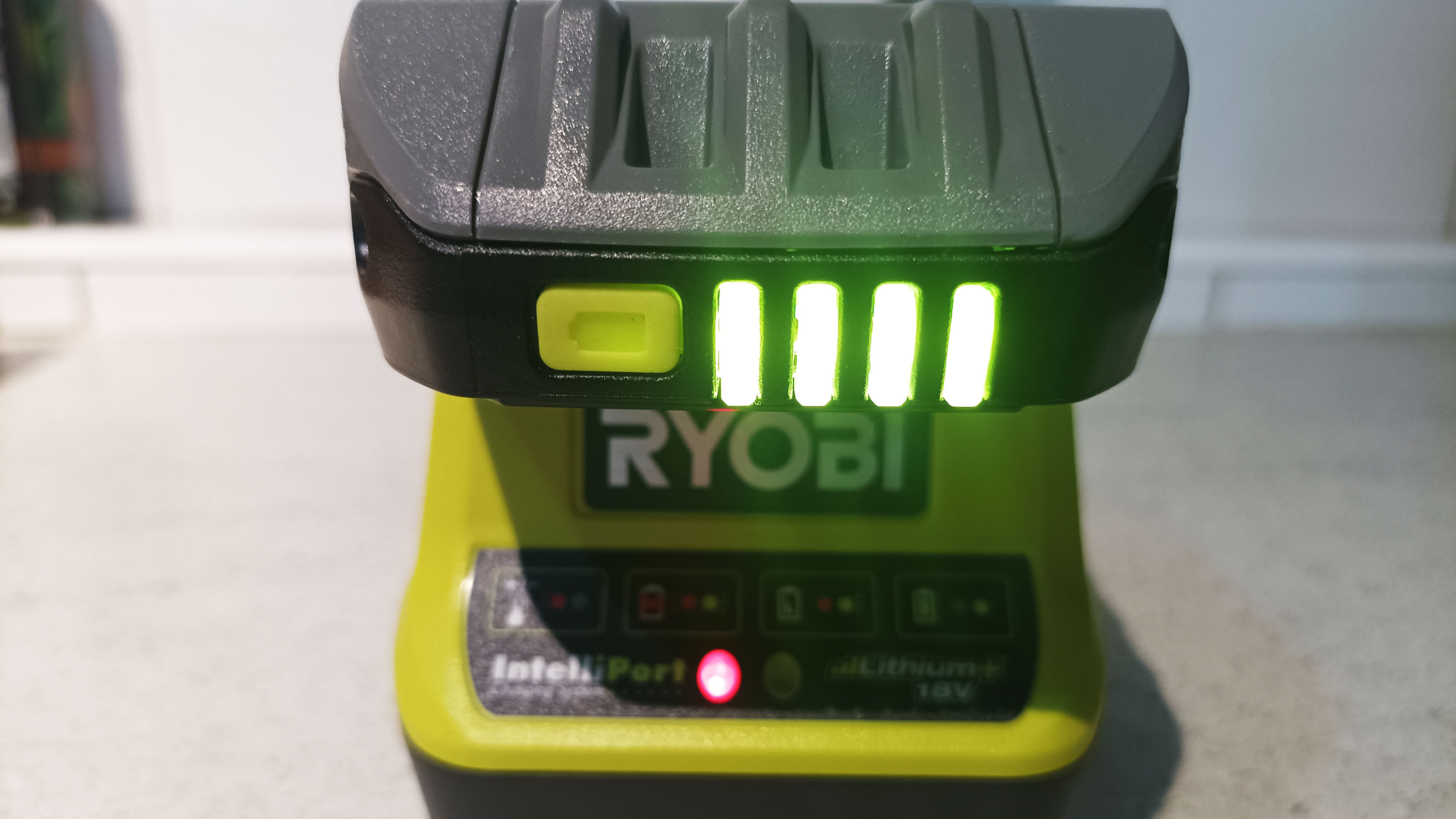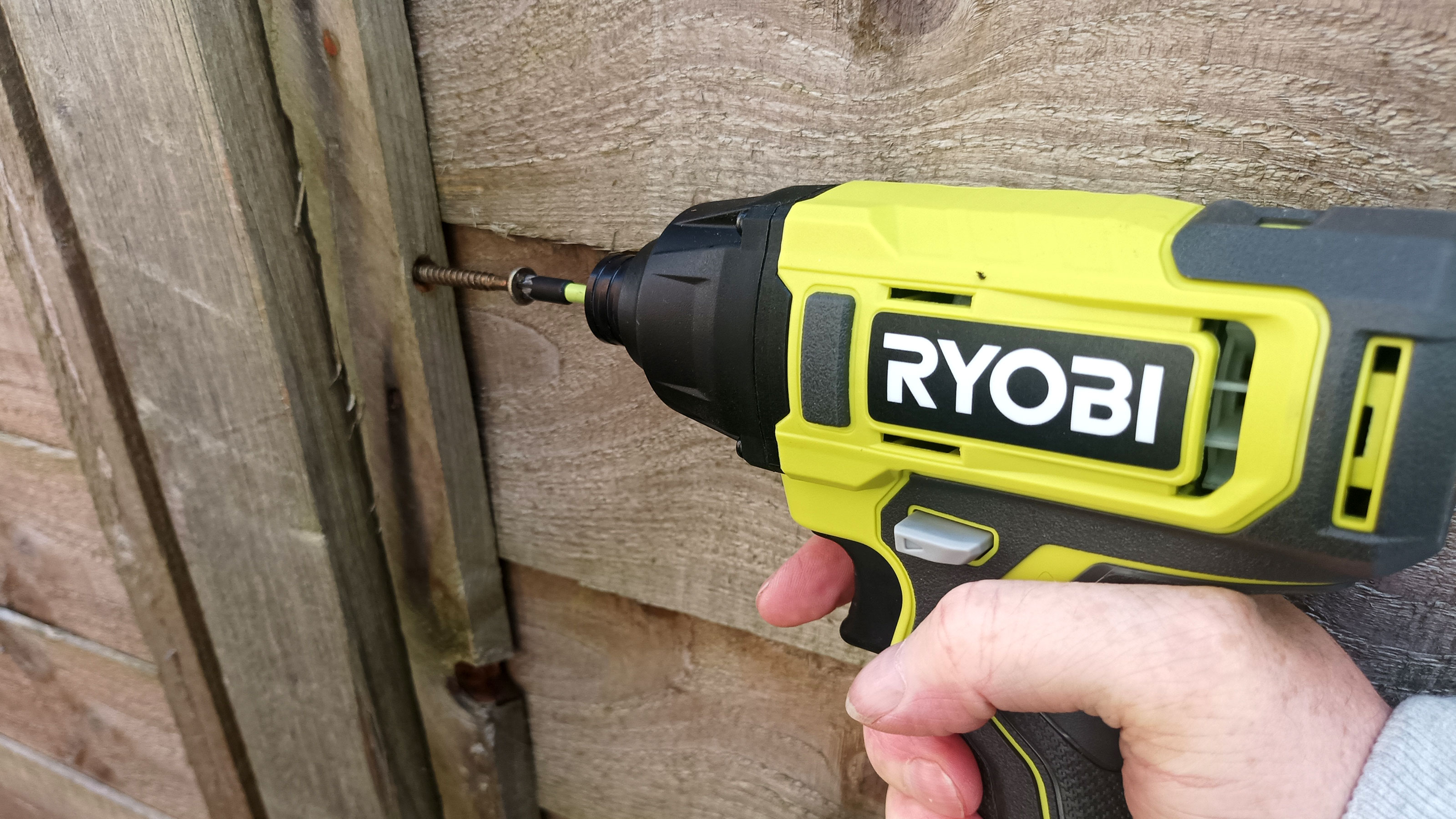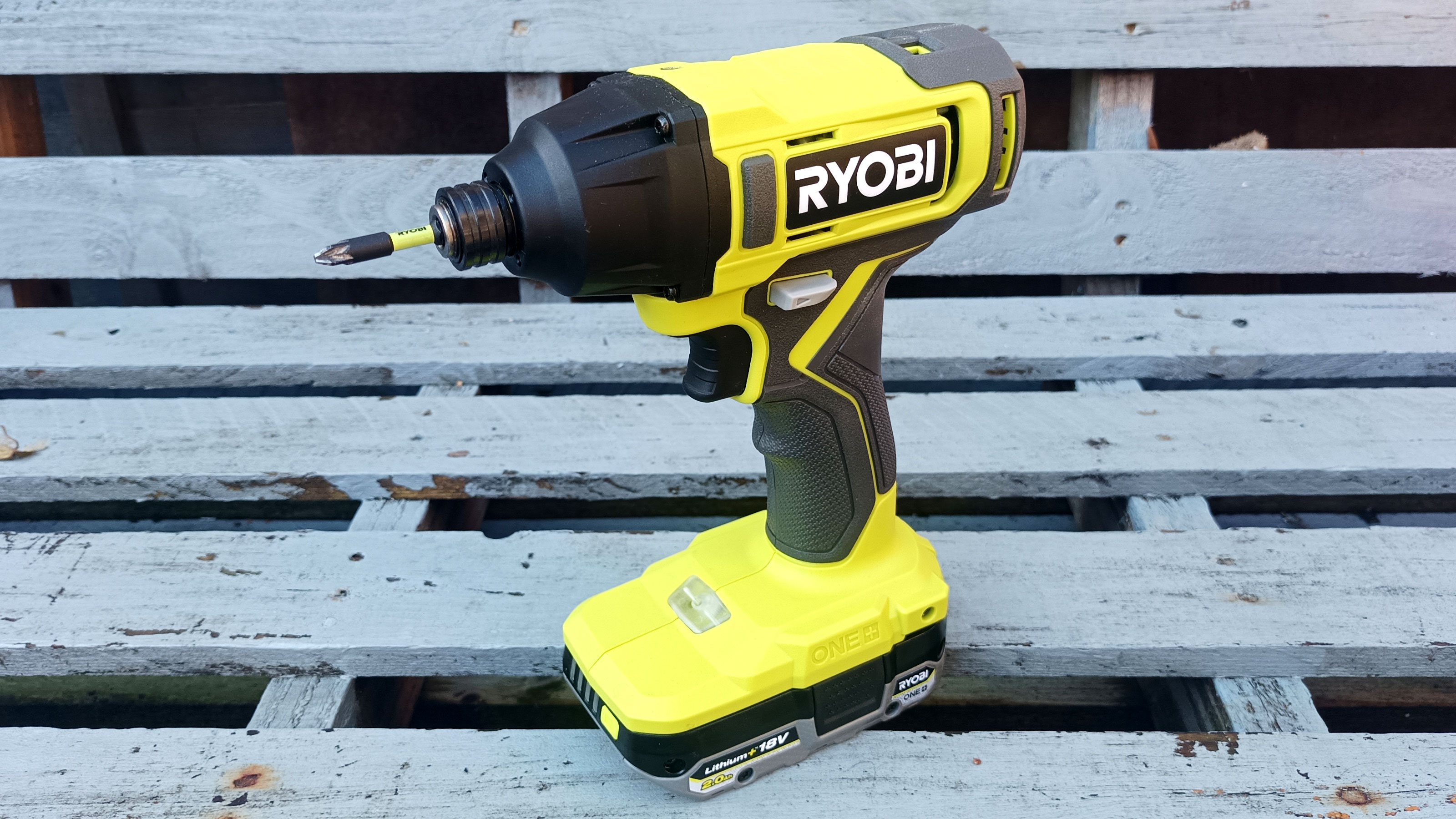Homebuilding Verdict
If you're on the lookout for a solid, straightforward impact driver then the Ryobi ONE+ Cordless Impact Driver is definitely one for your wish list. It has decent battery life, offers plenty of torque for DIY tasks that your cordless drill struggles with. Ideal for powering in large screws and bolts without any trouble.
Pros
- +
More torque than a drill
- +
Doesn’t struggle with DIY tasks
- +
Decent battery life
- +
Easy to control variable speed trigger
Cons
- -
Screwdriver bit didn’t last long
- -
Light could have been better
You can trust Homebuilding & Renovating.
The Ryobi ONE+ Cordless Impact Driver is a power tool that can tackle a host of tough DIY jobs. But, you probably already own a decent cordless drill so why do you need an impact driver as well?
On the surface impact drivers bear a striking resemblance to the best cordless drills, but a few subtle differences set them apart from your everyday drill. The body is typically slightly smaller, but the most noticeable change is the chuck. It’s smaller, being 6.35mm in size meaning it can only accommodate one size bit. But, don't panic, it can take on screwdriver bits, drill bits and with the help of an adaptor, different size sockets.
Under the surface the similarities continue, impact drivers will have brushed or brushless motors, but where they differ is in the amount of torque they produce. More torque means more power through the bit, meaning it can tackle DIY jobs that need more power and save the motor on your drill.
So how did the Ryobi ONE+ Cordless Impact Drive fare? Find out what I thought after putting it through a host of essential everyday DIY tasks.
Type: Cordless Impact Driver
Model no: RID18-0
Power source: Li-ion battery
Impact rate: 0 - 3800 ipm
Maximum torque: 240 Nm
No load speed: 0 - 3200 rpm
Chuck type: Keyless
Weight (without battery): 1.2 kg
Weight (with battery): 1.6 kg
Sound power level: 104.5 dBA
Unboxing the Ryobi ONE+ Cordless Impact Driver
It doesn't matter how many times I unbox a power tool, I still get excited about what lies inside the packaging. And on a less exciting note, I always want to know if the packaging can be recycled. It's rare that it isn't and the Ryobi ONE+ Cordless Impact Driver didn’t disappoint.
Resplendent in lime green you know you are getting a Ryobi product before you even open the box. There’s plenty of pointers on the packaging to what you are getting, what features the impact driver has and some neat simple infographics to tell you what the Ryobi can do.
It wasn’t easy to open the box, which is a good sign, but I like to keep mine like new so I took my time. Inside the packaging is simple and kept to a minimum, just enough to hold the impact driver, the drill bits and instruction manual.
As a cordless model you need a battery. Being part of the Ryobi ONE+ range means you can choose from a selection of compatible batteries with different power ratings. For this review I was furnished with the recommended 18V ONE+ 2.0AH Lithium+ Compact Battery and a Ryobi 2.0A Battery Charger to power up the battery.
These are essential extras to power the impact driver, but if like me you already have a charger and battery you can use these instead. But for this test I stuck with the battery and charger sent.
The 2.0AH battery is one of the least powerful in the Ryobi range, so it will need charging more often than a 4.0AH or 5.0AH battery, but there’s more of this later in the review.

How well built is the Ryobi?
The Ryobi is solid and sturdy and feels well built in the hand. It's well balanced and you get the impression that it's going to be with you a long time. But it's no heavyweight, weighing just 1.6kg with the battery, so you won't be struggling to use it for long periods.
Bring your dream home to life with expert advice, how to guides and design inspiration. Sign up for our newsletter and get two free tickets to a Homebuilding & Renovating Show near you.
A two-part rubberised grip sits neatly around the handle, making sure that you have full control over the driver even when at full tilt. Powering the Ryobi is a 3200 rpm motor that provides more than enough power for any DIY tasks and compares favourably with professional impact drivers that commonly have 3600 rpm motors. So its more than adequate for occasional or even regular DIYers.
What features does the Ryobi Cordless Impact Driver have?
Impact drivers may look like a drill, but they have more torque than a standard drill, a lot more in some cases. The Ryobi ONE+ Cordless Impact Driver comes with around 240 Nm, which is around four times more than you get on your average cordless drill. So it can tackle tougher DIY jobs such as screwing in long screws with ease. A two way (forward and reverse) rotation selector means it can unscrew just as well.
It also has a maximum impact rate of 3800 rpm, which helps push screws into a surface. This is a little less than a more powerful impact driver, but again its ideal for DIY tasks.
A variable speed trigger helps keep control of the power going through the driver, and is easy to control. It can gently introduce the power or go all out straight from the off.
A keyless standard sized 6.35mm (or quarter of an inch) chuck makes it easy to quickly change bits. It slips easily back into place to securely hold the bit. The Ryobi comes with two impact bits, and a 9.5mm socket adaptor (this works for small sockets, ideal for screwing in bolts).
We used the Philips bits for all our test tasks and by the end it was out of action. Personally, we would have liked to have seen at least three Phillips bits, for this very reason. Finally there is an LED light to light up the working area. It's powerful enough to do this but leaves an annoying shadow.
What’s the Ryobi ONE+ Cordless Impact Driver battery life?
The RYOBI is a bare tool so will need a battery to work. This is worth noting as you will need to pay extra for a battery and a charger if you’re a first time purchaser of a Ryobi tool. But on the plus side it's part of the ONE+ range, so if you already own a Ryobi cordless tool you will already have a charger and battery, which helps keep purchase costs down.
You may want to splash out on another battery so you don’t have to swap, or you might want to invest in a more powerful battery so you get more usage without recharging. An extra battery is always useful.
For this review I used a 18V ONE+ 2.0AH Lithium+ Compact Battery which according to the Ryobi website, it can drive in 180 decking screws on a single charge. A 4.0AH battery – which it is currently giving away with the Ryobi ONE+ Cordless Impact Driver bare tool – can deal with more than double the amount of screws, claiming 450. But this will depend on what type of screws and what type of job it's being used for.
To be honest we lost count of how many screws we used, but I went back and did a quick count up and it was just over 200 and the battery still had one bar left on the battery indicator. So I went back and added another 20-25 screws before the battery lost all juice.
But, how does this convert to time? This depends on how quick you are? We were averaging around 4-5 screws a minute across several different jobs (more on this below) over a few days. We timed each job (generally working 10-20 minutes each time) and adding together we got around 40-45 minutes use out of a single charge. But, if you're only doing one screw a minute it's going to last a lot longer.
So how long does it take to recharge the battery? I was using the 18V ONE+ 2.0A Battery Charger, which states that it takes 60 minutes to fully recharge the battery. In our test it took a little less than this, but not by any great margin.

How well did the Ryobi ONE+ Cordless Impact Driver work?
Alongside style you want substance and the Ryobi delivered. To test the Ryobi ONE+ Cordless Impact Driver we ran through a few everyday DIY tasks that an impact driver is commonly used for. First up we used 120mm screws to secure fence panels to wooden posts in our garden. I originally put up the fence panels using an everyday Black and Decker cordless drill. A lot of the screws didn't make it all the way as the drill didn’t have the torque.
But this was no problem for the impact driver. It easily dealt with any of the problems screws. But you need to be careful – and make use of the variable speed trigger – as the Ryobi is powerful enough to keep going and start splitting the wood. The same applies for the new screws that I put into my decking.
The final test was to drill into exterior masonry. We needed to purchase the bits separately as they didn’t come with the driver. This time I was using 100mm screws and had no problem drilling holes and fitting the screws. Inside, where I had struggled with my cordless drill putting up a shelf on the wall, the Ryobi did the job. And, at no point did I get the smell of burning motor, though it did get warm after quite intense use, but this wasn’t unexpected.
A few things that could be improved are the light and supplied drill bits. The light sits on the top of the battery holder pointing up and is efficient rather than outstanding. Personally, I prefer lights that sit around the chuck and light up the area in front. The screwdriver bits didn't last past this test, with the Philips being rendered useless, so had to purchase new bits. I know this can happen on DIY jobs, but would have liked them to have lasted longer.

Steve Jenkins is a freelance content creator with over two decades of experience working in digital and print and was previously the DIY content editor for Homebuilding & Renovating.
He is a keen DIYer with over 20 years of experience in transforming and renovating the many homes he has lived in. He specialises in painting and decorating, but has a wide range of skills gleaned from working in the building trade for around 10 years and spending time at night school learning how to plaster and plumb.
He has fitted kitchens, tiled bathrooms and kitchens, laid many floors, built partition walls, plastered walls, plumbed in bathrooms, worked on loft conversions and much more. And when he's not sure how to tackle a DIY project he has a wide network of friends – including plumbers, gas engineers, tilers, carpenters, painters and decorators, electricians and builders – in the trade to call upon.

